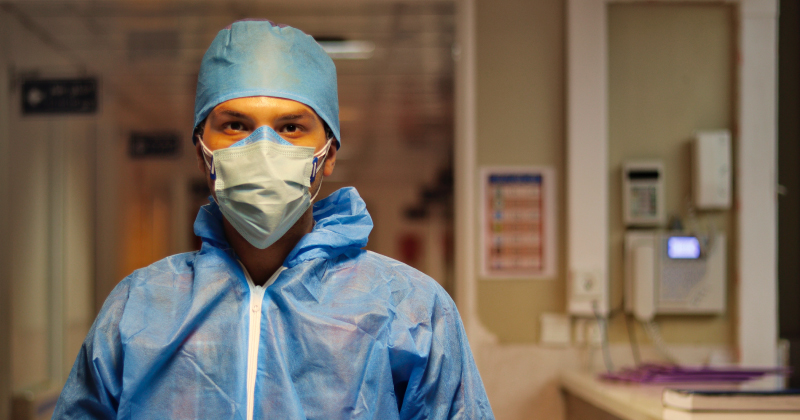We Hear You: Opening Ourselves to What Health Care Workers Are Feeling Now

[Editor’s Note: In this monthly blog post, MCN’s Director of Witness to Witness, Kaethe Weingarten, PhD, provides stories, resources, and helpful tips to support health care workers during these ongoing unprecedented times. Dr. Weingarten also offers a twice-monthly newsletter, filled with resources, recent articles, and her news and views. Sign up for the newsletter on the Witness to Witness webpage.]
At the end of last year, Dr. Nirav Shah, the Director of Maine’s Center for Disease Control and Prevention, mentioned a cartoon he had seen of a patient in a hospital bed being kept afloat by a struggling nurse who remained underwater. He commented, “Providers are literally keeping patients afloat, but at great cost to themselves.” That cartoon might also be about something else: health care providers keeping the entire health care system afloat! However, while it surely is at great cost to themselves, individuals -- no matter how courageous, determined, and amazing they are -- cannot fix the consequences of the global COVID-19 pandemic.
The current situations health care providers are facing make a tremendous impact on their well-being. Any suggestions I make about what we can do to support them is in no way taking a position that solutions are individual. On the contrary, as you will read, I believe that the solutions are systemic. However, since health care workers are suffering, I hope to contribute ideas about what we can all do in the spirit of making a positive difference.
Recently, an emergency department nurse, Audrey Wendt, wrote on her Facebook page about the wall she is building around herself to protect her from the sorrow she feels during every shift as she ministers to people who she knows will soon die of COVID-19. She also describes a range of other feelings she has as she confronts the situation at her Michigan hospital. That range includes pain, frustration, moral injury, loss, and anger.
In a CNN interview, she commented further: “I'll go out on a limb and say this, because this is not something that health care professionals like to admit: When you are working in an overflowing hospital, that compassion begins to turn into a horrible frustration with people who are unvaccinated. We love people, we want to save them, which creates this internal frustration and anger. But that anger is a secondary emotion and, ultimately, we have to let it go. I turn my focus to the fact that everybody deserves love and grace, no matter what.”
She is describing an internal process that is entirely admirable, in my view, but I dearly wish it weren’t the case that speaking about her frustration and anger felt like going out on a limb. I wish there were widespread acceptance of the righteous anger she feels. I wish that every health care worker believed that their communities understood their frustration and anger and expected no different from them. For, how can we expect a caring health care worker to not feel frustrated, when an effective protective measure -- vaccination -- isn't being utilized?
Each of us can do something for these health care providers. We can acknowledge their distress, we can validate it, we can let them know that their frustration and anger are a measure of how much, not how little, they care. We can let them know how sorry we are that they must build a wall to protect themselves, but express appreciation that they do so, even though that wall separates them from things they love.
During a recent Witness to Witness online seminar called “Tough Times: Easy Tools to Cope,” I talked about challenging feelings, including anger, and I talked about why I wouldn’t be talking about burnout.
“I am not talking about burnout because burnout is primarily about workplace conditions and this webinar is about you. Burnout is certainly happening – and attrition rates of health care workers show this – but the term is often misunderstood as implying individual inadequacy, rather than a rational response to system inadequacy, and I don’t want to contribute to that misperception.”
I was really gratified at the end of my talk by a comment from a participant. It made me feel that we had been successful in providing a resonant context for her experience to be understood and to feel welcomed. She said, “I’m a nurse out in the field and you really hit on it with everything you said because I’ve really been worried, ‘Am I normal,’ because I’ve been feeling really abnormal. Like what was wrong here? And you hit on everything I’ve felt today! Thank you!”
That is what we can each do, whether we are health care workers ourselves or know someone who is. We can be receptive to hearing the experience that health care workers are having. Whether a colleague or family member or friend or acquaintance, we can tell them we care. We can tell them we can hear whatever they have to tell us. What we can offer, of course, is small given what they endure, but still, even something small isn’t trivial. And we can never know what the ripples out may be.
Dr. Weingarten has developed numerous resources to support clinicians, including:
- Anger Amidst the Care: Tips for Clinicians on Dealing With Anger
- Coping with Moral Distress
- How to Re-establish Safety When You Have Been Jolted into a Stress Response
Find all of these and more at: https://www.migrantclinician.org/witness-to-witness
Got some good news to share? Contact us on our social media pages above.
Return to the main blog page or sign up for blog updates here.
- Log in to post comments





